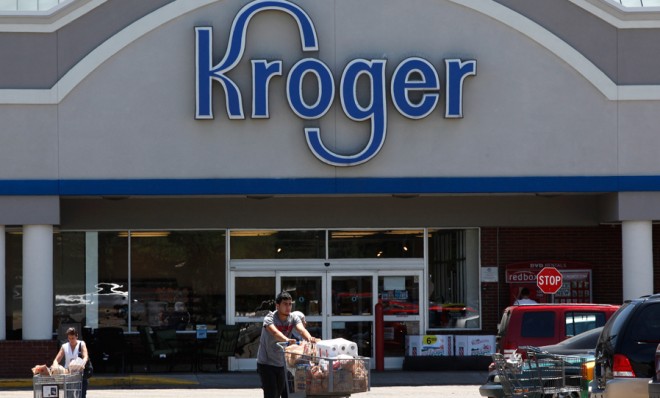Why would supermarket behemoth Kroger buy little Harris Teeter?
Hint: Location, location, location

On Tuesday, the grocery giant Kroger Company announced that it would buy Harris Teeter, a relatively small grocery chain, for $2.4 billion. Under the agreement, Kroger will purchase all outstanding shares of Harris Teeter for $49.38 per share in cash and assume $100 million in debt.
Though Kroger doesn't have the same brand-name cachet as a Target or a CVS, it wields its weight in sheer size. The grocer touts 2,500 locations spread across 31 states, making it the largest supermarket chain in the U.S. — and the second-largest retailer period, behind only Walmart. For the fiscal year ending Feb. 2., Kroger clocked an enormous $96.8 billion in revenue.
Over the past three decades, Kroger has picked up a variety of smaller brands, from Dillon Companies, the grocery chain that also owns Kwik Shop, to Fred Meyer, with its subsidies Ralph's, QFC, and Smith's. So why did it train its eye on Harris Teeter, a chain of 212 supermarkets scattered across the southern and Mid-Atlantic states?
The Week
Escape your echo chamber. Get the facts behind the news, plus analysis from multiple perspectives.

Sign up for The Week's Free Newsletters
From our morning news briefing to a weekly Good News Newsletter, get the best of The Week delivered directly to your inbox.
From our morning news briefing to a weekly Good News Newsletter, get the best of The Week delivered directly to your inbox.
A few reasons.
First, competition in the grocery industry has been intensifying in recent years as new types of retailers have entered the marketplace. Mega-stores like Target and Walmart have opened grocery sections, and dollar stores have grown their food aisles. On the opposite end, Whole Foods continues to establish strongholds in more affluent markets. To stay competitive, grocery stores have been rapidly consolidating.
Second, Harris Teeter may be comparatively small, but it's nestled in a desirable region. It "has stores in affluent vacation destinations, university communities and markets where populations are growing faster than the U.S. average," said Reuters. This includes the "Triangle Region" of North Carolina, home of Duke University, North Carolina State University, and University of North Carolina at Chapel Hill.
According to Triangle Business Journal, "Kroger has been losing grocery dollar market share in the Triangle for several years to Wal-Mart and Food Lion," and in the past two years has had to shut down three of its underperforming stores. Meanwhile, Harris Teeter is expanding in the area. "It ranked No. 3 in Triangle market share with 35 stores and $752 million in sales in 2012," said the paper.
A free daily email with the biggest news stories of the day – and the best features from TheWeek.com
Finally, Harris Teeter is no schlub itself. It posted $4.5 billion in revenue for fiscal 2012 — and its stock prise has risen 31 percent since January 18 when it announced it was up for sale. David B. Dillon, Kroger's chairman and chief executive officer said, "Harris Teeter is an exceptional company with a great brand, friendly and talented associates, and attractive store formats in vibrant markets run by a first-class management team." Kroger said it hopes to learn from the chain's online shopping set-up as well.
Carmel Lobello is the business editor at TheWeek.com. Previously, she was an editor at DeathandTaxesMag.com.
-
 Political cartoons for January 24
Political cartoons for January 24Cartoons Saturday's political cartoons include 3D chess, political distractions, and more
-
 Ryanair/SpaceX: could Musk really buy the airline?
Ryanair/SpaceX: could Musk really buy the airline?Talking Point Irish budget carrier has become embroiled in unlikely feud with the world’s wealthiest man
-
 Claudette Colvin: teenage activist who paved the way for Rosa Parks
Claudette Colvin: teenage activist who paved the way for Rosa ParksIn The Spotlight Inspired by the example of 19th century abolitionists, 15-year-old Colvin refused to give up her seat on an Alabama bus